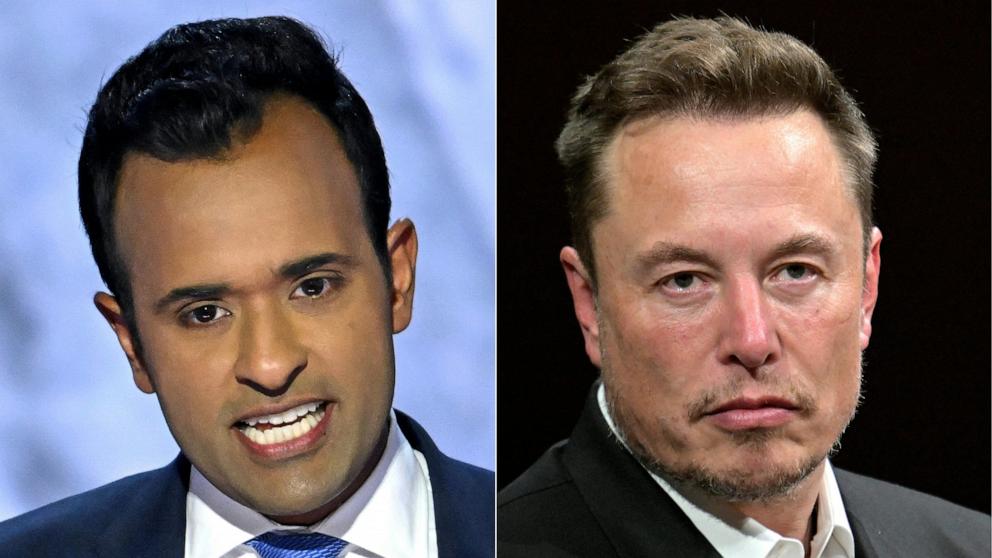WASHINGTON — Tech entrepreneurs Elon Musk and Vivek Ramaswamy outlined a plan Wednesday for President-elect Donald Trump to oversee a massive reduction in the federal workforce, arguing the employees won’t be needed after Trump eliminates “thousands of regulations” in his next administration.
Musk and Ramaswamy, who Trump last week named co-heads of a new Department of Government Efficiency, singled out in a Wall Street Journal op-ed federal employees “who view themselves as immune from firing thanks to civil-service protections.”
The duo pointed to recent Supreme Court decisions to argue the incoming president has the executive power to nullify many regulations, pursue “large-scale firings” of federal workers and relocate some agencies outside of Washington. They said “a drastic reduction in federal regulations” would require vastly fewer federal employees.
“DOGE intends to work with embedded appointees in agencies to identify the minimum number of employees required at an agency for it to perform its constitutionally permissible and statutorily mandated functions,” their op-ed reads.

Musk and Ramaswamy, two loyal Trump allies, were tapped to lead the effort to “dismantle government bureaucracy, slash excess regulations, cut wasteful expenditures, and restructure federal agencies.” Although dubbed a department, the Musk/Ramaswamy-led effort is effectively an outside advisory commission − not a formal agency − with no legal authority.
The incoming Trump administration is expected to revive a plan to convert some employees to “Schedule F,” status which ᵴtriƥs them of job protections, among other efforts to cut the workforce.
Musk and Ramaswamy said the number of federal employees to cut “should be at least proportionate” to the number of regulations that are eliminated. “Not only are fewer employees required to enforce fewer regulations, but the agency would produce fewer regulations once its scope of authority is properly limited,” they said.

They did not specify how many workers could be downsized, or which agencies would be targeted, if their plan is carried out. They said “employees whose positions are eliminated deserve to be treated with respect, and DOGE’s goal is to help support their transition into the private sector,” without providing specifics on how such a transition would work.
Trump would be able to use existing laws to give targeted federal workers incentives for early retirement and provide voluntary severance payments “to facilitate a graceful exit,” they added.
Musk, the richest man in the world, has quickly turned into a leading voice in Trump’s orbit. The president-elect joined Musk in Brownsville, Texas, on Tuesday for the launch of Musk’s SpaceX Starship.
In the WSJ op-ed, Musk and Ramaswamy cited the Supreme Court’s 2022 West Virginia v. Environmental Protection Agency and 2024 Loper Bright v. Raimondo decisions to argue “a plethora of current federal regulations exceed the authority Congress has granted under the law.”

Their group plans to install legal experts within federal agencies to review regulations before presenting a list of rules for Trump to consider halting through executive action and initiating a process for review and rescission.
Musk and Ramaswamy acknowledged “conventional wisdom” might suggests civil-service protections prevent the president from firing federal workers. But they argued Trump has the broad power − under the Supreme Court’s 2021 Collins v. Yellen decision − to pursue “reductions in force” that don’t target specific employees.
They also floated the possibility of requiring these workers to return to in-person work five days a week, predicting it “would result in a wave of voluntary terminations that we welcome.”
“If federal employees don’t want to show up, American taxpayers shouldn’t pay them for the Covid-era privilege of staying home,” they said.

Democrats and other Trump opponents have criticized the DOGE undertaking, arguing Trump and his allies aim to end government protections in a host of critical areas, from education to the environment to entitlement programs. They’ve also jabbed Trump for bringing in two individuals to fill the job of one, though Musk and Ramaswamy have said they won’t take salaries for their positions.
“We are entrepreneurs, not politicians,” they wrote in the op-ed. “We will serve as outside volunteers, not federal officials or employees. Unlike government commissions or advisory committees, we won’t just write reports or cut ribbons. We’ll cut costs.”
